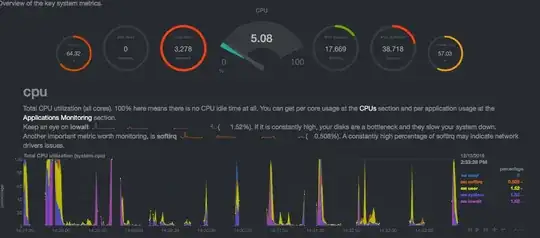I am noticing a weird issue, my Ubuntu (web)server randomly freezes, for a few seconds and afterwards recovering again. The server has the following specifications;
- 2 vCores of 2,4 GHz
- 8GB of RAM
- 40GB SSD
- 100 MBit network
I am mainly running the following services on the server;
- NGINX (webserver and proxy)
- Mysql
- Varnish
The issue doesn't occur every day, but on the days that it does it usually happens very frequently (about every 20 seconds). I am running Netdata as a web monitoring tool and Newrelic for critical issues.
 This is a screenshot of the CPU graph taken from the Netdata dashboard, as you can see the server stops reporting stats when the freeze occurs. I found out that sometimes the IO/Wait spikes just before seeing the server freeze, but after reading threads and Googling about high IO/Wait I could not find anything useful other than that the
This is a screenshot of the CPU graph taken from the Netdata dashboard, as you can see the server stops reporting stats when the freeze occurs. I found out that sometimes the IO/Wait spikes just before seeing the server freeze, but after reading threads and Googling about high IO/Wait I could not find anything useful other than that the [jbd2/vda1-8] process is constantly writing to the disk.
When running monitoring tools like top, ps, iotop and htop I do not see any process using excessive amounts of resources, even when the freezing issue occurs.
When logging into the server using the hosting provider's (OVH's) KVM I see the following message; NMI watchdog: BUG: soft lockup CPU#0/1 stuck for 21s! [process]. Also researching that error message didn't provide much information or a solution.
I am currently running out of ideas on what could cause these issues so any help is appreciated.